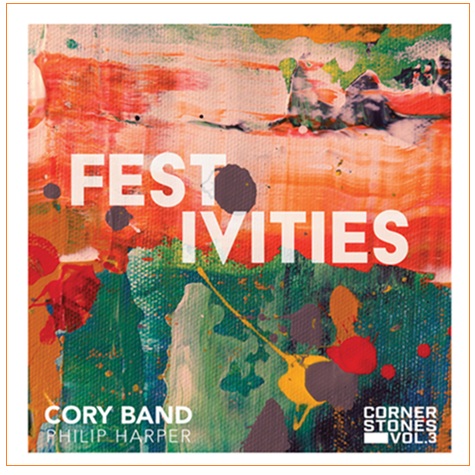
Cory Band
Conductor: Philip Harper
Doyen Recordings: DOY CD451

Philip Harper’s 2019 ‘impulse’ to create a series of recordings of some of the most significant works of the brass band genre has progressed to explore links to musical landscapes and variations.
The third in the series is an appreciation of ‘festivities’ – five works spanning an arc from 1921 to 1993, which he feels display a defined ‘celebratory spirit’. It’s perhaps a somewhat gossamer title proposition, although through the strength of the performances he draws, he certainly makes for an imposing case for its defence.
Noblesse oblige
‘Pageantry’ remains a masterful celebration of noblesse oblige – an evocative of time and place built on detail and expanse, technique and musicality. Howell’s score is infused with majesty and occasion, Philip Harper’s interpretation and the playing he elicits, the same; the opening ‘King’s Herald’, high born and high class, the ‘Cortege’ courtly rather than funereal, ‘Jousts’ a bravura call to arms.
Howell’s score is infused with majesty and occasion – Philip Harper’s interpretation and the playing he elicits, the same
In contrast, ‘Life Divine’ is nothing more than romanticized musical metaphor – even its title a piece of re-invented bluster every bit as colourful as Cyril Jenkins’ flamboyantly ornate score. The MD though still captures its true essence - the performance splendidly bombastic, shimmering with vibrato, the solo playing classy in show-off quality.
Appreciation
Eric Ball’s appreciation of form in ‘Festival Music’ is elegant craftsmanship borne of high-tensile substance – a celebration of the tri-centenary of Mozart’s birth honoured with masterful triptych courtesy. Everything presented here is lightened in tonality and carefully calibrated in breadth, the ensemble playing compact, the soloists pinpoint in their delivery.
The poet Philip Larkin, rather than Gilbert Vinter perhaps expressed the most accurate feelings of early 1960s youth when he wrote that, “life was never better in 1963, between the end of the Chatterley ban and the Beatles’ first LP.”
The poet Philip Larkin, rather than Gilbert Vinter perhaps expressed the most accurate feelings of early 1960s youth when he wrote that, “life was never better in 1963, between the end of the Chatterley ban and the Beatles’ first LP.”
By then the post war ‘Salute to Youth’ (premiered in 1962) era of brylcreamed ‘Resilience’, stifled ‘Romance’ and fun fair ‘Relaxation’ was soon to be replaced by student protest, the sexual revolution, and LSD.
Summer of Love
Vinter was undoubtedly ahead of his time, but even he would have been startled by the resultant pace of change, although the MD gives an enticing glimpse of the future with his approach; the opening bold and questioning, the central section rampantly passionate, the finale, carefree in its free-flowing joyfulness. It’s as if he has jumped forward to 1967 and the Summer of Love.
Every celebratory element explored in these works seems to have been chucked into a glorious melting pot of character portraiture in ‘Masquerade’
Every celebratory element explored in these works seems to have been chucked into a glorious melting pot of character portraiture in ‘Masquerade’ – Philip Wilby’s deliciously expressed comeuppance of Shakespeare’s Falstaff, by wit, subterfuge, revelry and female waspishness.
Philip Harper peels back the layers of detail to bring us a heroic rogue, proud, pompous and preening, ready to be pricked into glorious submission. The characterisation is splendid, so too the audaciousness of the playing that draws you right into the centre of Windsor Great Park for a night to glory in.
Iwan Fox
To purchase:
CD: https://www.worldofbrass.com/102397
Download: https://www.worldofbrass.com/102397-download
Wobplay: https://wobplay.com/
Play list:
1. Life Divine (Cyril Jenkins)
2. Festival Music (Eric Ball)
i. Overture
ii. Romance
iii. Impromptu
5. Masquerade (Philip Wilby)
6. Salute to Youth (Gilbert Vinter)
i. Resilience
ii. Romance
iii. Relaxation
9. Pageantry (Herbert Howells)
i. King’s Herald
ii. Cortege
iii. Jousts









